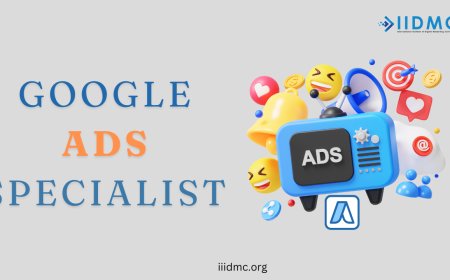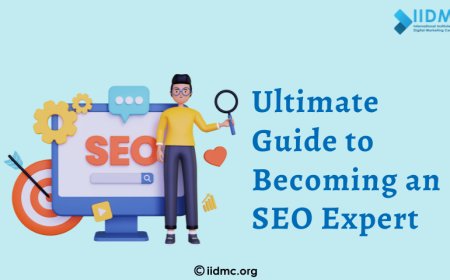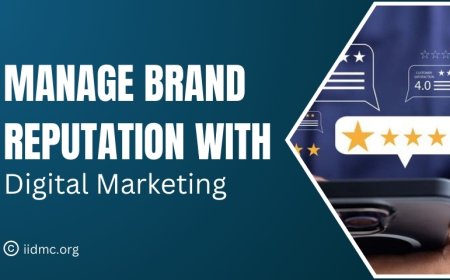Essential Skills Gained Through Content Marketing Certification
Content marketing certification equips you with the skills to create content, drive traffic, and measure success, preparing you for a successful career.
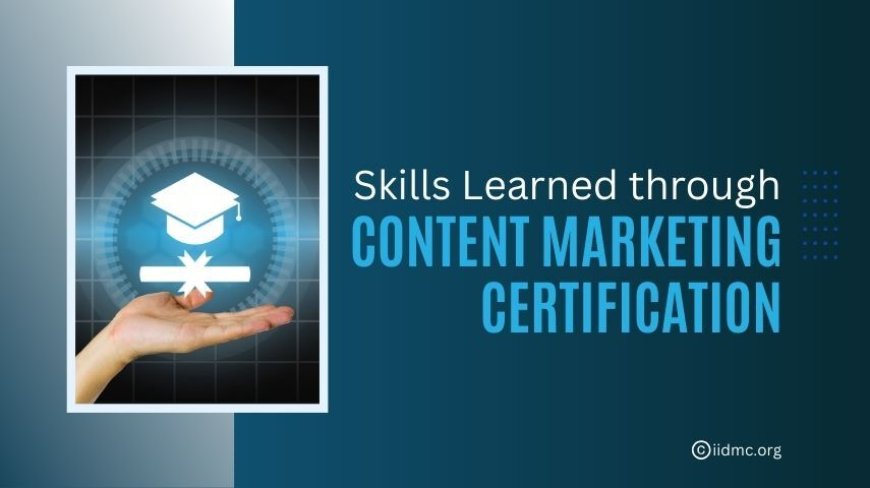
Content marketing has become an essential part of any successful digital marketing strategy. With businesses focusing more on providing value through informative and engaging content, there is a growing demand for professionals skilled in content creation, strategy, and distribution. By completing a Content Marketing Certification, you can gain the expertise needed to build and execute content strategies that drive results. This certification helps you understand how to reach your target audience effectively, create content that resonates with them, and measure the impact of your efforts.
The Content Marketing Certification not only teaches you the basics but also provides advanced skills that help you stand out in the competitive digital marketing field. From mastering SEO techniques to crafting compelling copy, you will learn how to produce content that ranks well in search engines and engages audiences across various platforms. The certification also focuses on practical skills like analytics, content planning, and performance tracking, all of which are vital for creating data-driven content strategies. These skills are crucial for anyone looking to enhance their career in content marketing.
Understanding the Importance of Content Marketing
Content marketing is all about creating helpful, valuable content that attracts and keeps customers. Here’s why it’s so important:
-
Builds Trust: By providing useful content regularly, businesses can build trust with their audience. When people find content that helps them, they’re more likely to come back and trust the brand.
-
Improves SEO: Good content helps your website show up in search engines like Google. This means more people can find your business online, leading to more traffic.
-
Connects with Your Audience: Content marketing lets you directly talk to your audience. Whether it’s through blogs, social media, or videos, it helps businesses connect with customers and make them feel heard.
-
Cost-Effective: Compared to traditional advertising, content marketing is cheaper and offers lasting results. You don’t need a big budget to create content, and it can keep working for you long after it's published.
Why Choose Content Marketing Certification?
Content marketing certification helps you learn the skills you need to succeed in this field. Here’s why it’s a good choice:
-
Structured Learning: These certifications provide a clear path to learning. You’ll know exactly what to focus on and how to apply it in the real world.
-
Boosts Credibility: Getting certified shows employers or clients that you have the skills and knowledge to handle content marketing tasks. It adds value to your resume.
-
Career Growth: With businesses relying more on content marketing, there’s high demand for skilled professionals. Having a certification can help you get noticed and land a better job or promotion.
-
Hands-on Skills: Content marketing certifications teach you how to create content, use SEO, and track results. These are all practical skills that you can immediately apply to your work.
Important Skills you can learn from Content Marketing Certification
Content marketing certification teaches essential skills that help you create, optimize, and distribute valuable content. You’ll learn how to build effective strategies, improve SEO, engage audiences, and measure performance. These skills are key to driving results and growth in digital marketing.
1. Content Strategy Development
To effectively market content, you must first develop a well-thought-out strategy. Content strategy development is one of the foundational skills you gain through certification.
-
What you learn: You’ll learn how to develop a content strategy that aligns with business goals and resonates with the target audience. This involves understanding the needs of your audience and creating content that speaks to them.
-
Key skills:
-
Audience Research: Discovering the interests, needs, and behaviors of your audience. Certification programs teach you how to use tools like surveys, polls, and social listening to gather insights.
-
Content Calendar Creation: Creating a content calendar is crucial for staying organized and ensuring that you publish relevant content at the right time. This includes deciding on content formats (e.g., blog posts, videos, infographics) and scheduling them for maximum impact.
-
Goal Setting: Setting clear, measurable goals for your content efforts. This includes defining objectives such as increasing website traffic, improving engagement, or generating leads.
By understanding these aspects, you’ll be able to build an effective content strategy that’s aligned with your audience’s needs and business objectives.
2. SEO and Content Optimization
Search Engine Optimization (SEO) is a critical skill for content marketers. SEO ensures that your content appears in search engine results when users search for topics related to your business.
-
What you learn: You’ll understand how to optimize your content to make it visible to search engines, ultimately driving more organic traffic to your website.
-
Key skills:
-
Keyword Research: This is one of the first steps in SEO. You’ll learn how to identify the right keywords that potential customers are searching for. This includes using tools like Google Keyword Planner, SEMrush, or Ahrefs to find high-traffic keywords.
-
On-Page SEO: Learning how to optimize your individual pages is crucial. This includes using keywords in titles, headers, meta descriptions, and alt text. On-page SEO also covers things like URL structure and internal linking.
-
Content Structure and Readability: Content that’s well-organized and easy to read performs better with both search engines and human readers. You’ll learn how to use bullet points, subheadings, short paragraphs, and multimedia (like images or videos) to make content more user-friendly.
-
Link Building: Link building is an SEO tactic that involves getting backlinks from authoritative websites to improve your site’s authority and ranking. You’ll learn how to create shareable content that encourages other sites to link to yours.
Learning SEO will help your content rank higher in search results, ensuring it reaches a larger audience and generates more traffic.
3. Content Creation and Copywriting
Content creation is the core of content marketing. Certification programs teach you how to create compelling content that attracts and engages your audience.
-
What you learn: You’ll learn how to craft different types of content, such as blog posts, case studies, videos, and social media posts. Good copywriting is about more than just writing; it's about creating content that is valuable and persuasive.
-
Key skills:
-
Understanding Content Formats: Each content type has a unique structure. You’ll learn how to write engaging blog posts, create shareable social media posts, design eye-catching infographics, and even create video content that tells a story.
-
Effective Copywriting: Copywriting is the art of writing content that persuades your audience to take action. You'll learn how to write clear, engaging, and persuasive copy that converts readers into customers or leads.
-
Storytelling: Content marketing is all about storytelling. You’ll learn how to craft stories that resonate with your audience’s needs, desires, and emotions, helping them connect with your brand.
-
Multimedia Content Creation: Content isn’t just limited to text. In certification programs, you’ll learn how to create multimedia content like videos, infographics, and podcasts, which can further engage your audience and improve your content strategy.
Learning content creation and copywriting will help you produce engaging content that grabs attention, educates your audience, and persuades them to take action.
4. Analytics and Performance Tracking
To know whether your content marketing efforts are working, you need to track and measure performance. Analytics is the key to understanding how well your content is performing and identifying areas for improvement.
-
What you learn: You’ll learn how to measure content performance using data-driven tools. Understanding metrics like traffic, conversion rates, and engagement is essential for refining your strategy.
-
Key skills:
-
Google Analytics: One of the most important tools for tracking website traffic and user behavior. You’ll learn how to set up Google Analytics, track key metrics, and generate reports to measure the effectiveness of your content.
-
KPIs and Metrics: Key performance indicators (KPIs) are used to measure content success. You’ll learn how to track metrics like page views, time on page, bounce rate, social shares, and conversions.
-
Data Interpretation: The ability to analyze data and draw conclusions is crucial. You’ll learn how to interpret metrics to understand what’s working and what’s not. This will allow you to make adjustments and improve future content.
Being able to track and analyze content performance will help you make smarter decisions and optimize your content marketing efforts for better results.
5. Social Media Marketing and Distribution
Once your content is created, you need to distribute it to the right audience. Social media is one of the best channels to share content and engage with your audience.
-
What you learn: You’ll learn how to use social media platforms (such as Facebook, Instagram, LinkedIn, Twitter, etc.) to share content and interact with your audience.
-
Key skills:
-
Platform Selection: Different social media platforms attract different audiences. You’ll learn how to choose the right platforms for your content and target audience.
-
Scheduling and Consistency: Regular posting is important for staying visible. You’ll learn how to schedule posts in advance using tools like Buffer or Hootsuite.
-
Engagement: Interacting with your audience through comments, likes, shares, and private messages will help build relationships. You’ll learn strategies for boosting engagement and fostering community interaction.
Learning social media marketing ensures that your content reaches its intended audience and creates meaningful interactions with potential customers.
6. Email Marketing Integration
Email marketing remains one of the most effective ways to nurture relationships with your audience. A content marketing certification program will teach you how to integrate email marketing with your content strategy.
-
What you learn: You’ll learn how to create email campaigns that deliver content directly to your subscribers and drive conversions.
-
Key skills:
-
List Building: Growing your email list is the first step in email marketing. You’ll learn how to use lead magnets like eBooks, webinars, and checklists to encourage sign-ups.
-
Email Segmentation: By grouping your email list based on demographics, behaviors, and interests, you’ll learn how to send targeted emails that resonate with each group.
-
Email Copywriting: Writing effective email copy is a skill you’ll develop, including creating compelling subject lines, engaging content, and clear calls-to-action.
Email marketing ensures that your content is delivered directly to your audience's inbox, increasing engagement and driving conversions.
Benefits of Content Marketing for Businesses
Content marketing offers businesses many advantages, and here’s how it helps them grow:
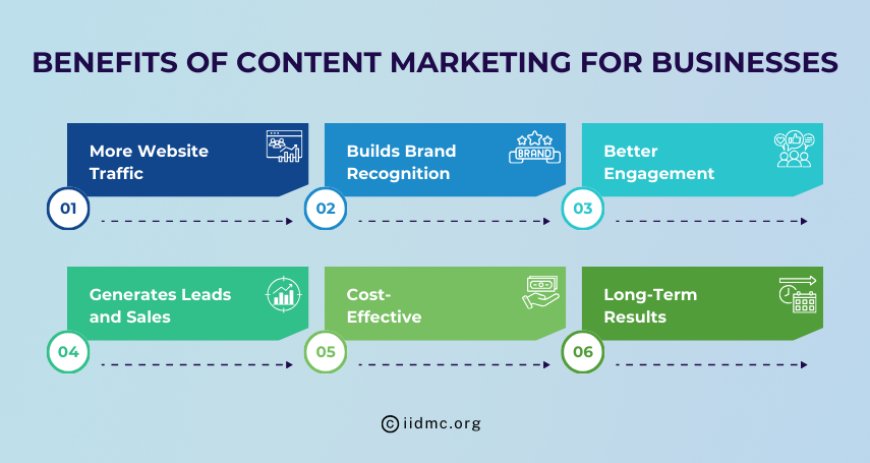
-
More Website Traffic: Great content helps bring people to your website. When your content is easy to find, more people will visit your site.
-
Builds Brand Recognition: Content helps businesses get noticed. By regularly posting helpful or entertaining content, you can make sure your brand stays on people’s minds.
-
Better Engagement: Content marketing allows businesses to interact with customers. Through blog posts, social media, or videos, businesses can engage with their audience, answer questions, and build relationships.
-
Generates Leads and Sales: Good content can encourage people to take action, such as signing up for newsletters, downloading guides, or buying products.
-
Cost-Effective: Compared to traditional ads, content marketing costs less. It’s a cheaper way to reach your audience, and it continues to work long after you create the content.
-
Long-Term Results: Unlike paid ads that stop working once you stop paying, content marketing provides long-lasting results. Once you create quality content, it continues to attract visitors and build your brand over time.
The Impact of Content Marketing on Career Growth
Content marketing can also help you grow your career. Here’s how it can impact your job prospects:
-
More Job Opportunities: As businesses rely more on content marketing, they need skilled professionals. Content marketing certification helps you stand out and opens up more job opportunities.
-
Skill Development: With certification, you’ll learn valuable skills like writing, SEO, analytics, and social media management. These are skills that are in high demand in today’s job market.
-
Higher Salaries: Companies are willing to pay more for certified content marketers. With the right skills, you can earn a higher salary or get a promotion in your current job.
-
Freelance and Consulting: Content marketing is also a great career for freelancers. You can offer your expertise to businesses that need help with content strategy, SEO, or social media marketing.
-
Build Your Personal Brand: Content marketing allows you to create and share your own content. This helps you establish yourself as an expert in your field and attract more clients or job opportunities.
How to Get Certified in Content Marketing
Getting certified in content marketing is a great way to gain valuable skills and boost your career. Here’s a simple guide on how to earn your content marketing certification:
-
Choose a Reputable Institute
-
Research and select a content marketing certification program from a reputable institute. Make sure the institute offers a comprehensive curriculum that covers key aspects of content marketing, including content strategy, SEO, analytics, and social media marketing.
-
Enroll in the Program
-
Once you’ve identified the right program, sign up and begin the course. Many institutes offer online courses that can be taken at your own pace, with flexible learning schedules. Some courses may be free, while others might require a fee.
-
Complete the Coursework
-
Engage with all the lessons, videos, and materials provided in the course. The coursework will typically cover topics like creating engaging content, understanding SEO, tracking performance with analytics, and how to distribute content effectively.
-
Take your time to understand the concepts, as these will help you apply what you’ve learned in real-world situations.
-
Take Practice Tests
-
Many programs offer practice tests or quizzes after each section. These tests help you assess your understanding of the material and prepare for the final certification exam.
-
Use these practice tests to identify any areas where you may need further study or review.
-
Pass the Certification Exam
-
After completing the course and practice tests, you’ll need to take a final exam to earn your certification. The exam will cover all the topics you studied throughout the course.
-
Ensure you’ve reviewed all the course materials thoroughly so you’re well-prepared to pass the exam.
-
Receive Your Certification
-
Once you pass the exam, you’ll receive your official content marketing certification. Many institutes provide a digital certificate or badge, which you can showcase on your resume, LinkedIn profile, or personal website to highlight your new skills.
Best Institute Offering Content Marketing Certification
If you want to get certified in content marketing, the International Institute of Digital Marketing Certifications (IIDMC) is a leading institute that offers professional digital marketing certification. It provides high-quality online courses that are designed to help individuals develop the skills needed to succeed in the digital marketing industry. IIDMC’s courses cover a wide range of topics, including content marketing, SEO, social media, and more. The institute is known for its practical, hands-on learning approach, experienced instructors, and globally recognized certifications that can boost your career in digital marketing.
Why Choose IIDMC?
-
Globally Recognized Certification: IIDMC’s certification is well-known and respected all around the world. This means that the skills you learn are valuable to employers no matter where you are.
-
Complete and Clear Curriculum: The content marketing program at IIDMC covers everything you need to know, like content planning, SEO, social media, and creating content that works. The lessons are designed to teach you how to create marketing strategies that actually get results.
-
Hands-On Learning: IIDMC focuses on real-world learning. You’ll work on practical projects, real-life examples, and activities that help you understand how to apply what you learn to real marketing situations.
-
Flexible Learning: IIDMC offers online courses, which means you can study at your own pace and on your own schedule. Whether you’re busy with work or school, you can fit the course into your life.
-
Support and Networking: IIDMC offers support throughout the course, so you never feel lost. You also get to connect with other students and professionals, giving you the chance to network and grow your career.
Content marketing certification equips you with the essential skills needed to succeed in the digital marketing world. You’ll learn how to create engaging content, build effective content strategies, and optimize content for search engines (SEO). The certification also teaches you how to distribute content across different platforms like social media and email. Additionally, you’ll develop the ability to analyze content performance using data and adjust strategies accordingly. These skills are crucial for attracting, engaging, and converting your target audience into loyal customers.



























